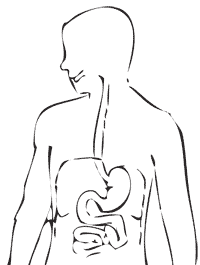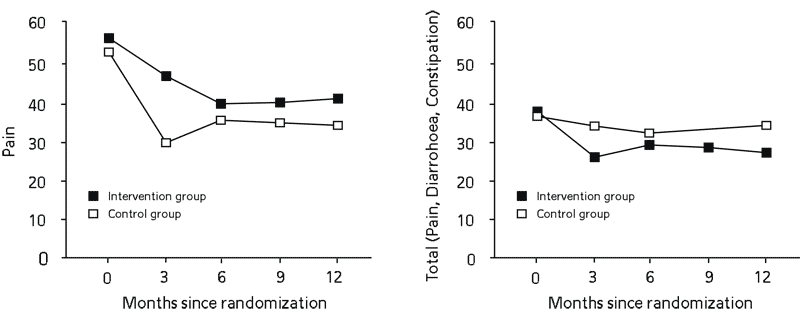Hypnosis for irritable bowel syndrome

Irritable bowel syndrome (IBS) is a very common functional disorder of the gastrointestinal (GI) system. IBS is thought to be due to changes in the way the gut functions, but is not associated with any observable structural changes to the gut. Up to 15% of adults suffer from IBS and related symptoms. IBS is diagnosed according to the Rome III criteria which include:
Abdominal pain or discomfort for at least 3 days per month in the last three months, where at least 2 of the following were true: the pain or discomfort was relieved by defecation and/or the start of the pain or discomfort was associated with changes in stool frequency and/or the start of the pain or discomfort was associated with altered stool appearance.
It is important for your doctor to thoroughly check that your symptoms are not the result of other disorders. Other abnormalities in the gut such as parasite infections, Chrohn's disease, ulcerative colitis and lactose intolerance can all produce similar symptoms to IBS.
How hypnosis is used to treat IBS
There is a very good website about IBS and hypnosis run by Dr Olafur Palsson who has developed a standardised protocol using hypnosis to treat IBS:
Qualified clinicians can contact Dr Palsson for a copy of his protocol.
Evidence supporting the use of hypnosis in the treatment of IBS
There have been a number of studies assessing the effectiveness of hypnotherapy in the treatment of IBS.
Meta analysis
- Schaefert et al (2014) published a meta-analysis of the effectiveness of hypnosis as a treatment for IBS. Their analysis included the results of 8 randomised controlled trials. At the end of treatment hypnosis was found to be superior to control conditions in producing symptom relief, and in improving gastrointestinal symptoms. At follow-up, hypnosis was still more effective in producing symptom relief, but not on a measure of gastrointestinal symptoms. The authors conclude that hypnosis provided long-term adequate symptom relief in 54% of patients.
Systematic review
- In a systematic review of the evidence Wilson and colleagues (2006) identified 20 studies and 2 case series with over half the studies identifying hypnotherapy as being effective in the management of IBS. However, they note that the majority of the trials are uncontrolled (i.e. with no placebo or control treatment arm) and so potentially overestimate the size of treatment effects because they do not take into account the placebo effect or regression to the mean. They recommend that a high-quality randomized placebo controlled trial be conducted.
- Reviewing the same studies, and again acknowledging the limitations of the literature, Whitehead (2006) concludes that hypnosis demonstrates a consistent therapeutic impact on IBS - even for patients unresponsive to standard medical interventions.
Randomised controlled trials
- In an early study Whorwell et al (1984) compared 15 patients randomly assigned to hypnotherapy with 15 patients assigned to psychotherapy plus placebo pills. All patients had severe unresponsive symptoms at the beginning of the study. The hypnosis group showed a greater improvement in well-being and bowel activity, and showed no relapses during the three-month follow-up.
- Houghton et al (1996) compared 25 IBS patients given hypnosis with 25 patients treated with other methods and demonstrated greater benefits in the hypnosis group.
- Palsson et al (2006) compared patients given a home treatment hypnosis programme with those given standard medical care. By three months 53% of the hypnosis group had improved compared to 26% of the controls.
- Roberts et al (2006) conducted a randomized controlled trial of gut-directed hypnotherapy for IBS. In contrast to many other studies which have taken patients from secondary (specialist) care this study took patients from primary care, where the majority of IBS cases are seen. Patients either received standard care or standard care + gut-directed hypnotherapy. After 3 months, at the end of treatment, patients in the intervention group improved more than those in the control group on measures of pain and diarrhoea. However, the patients in standard medical care continued to improve and differences were not evident at 12 month follow-up except for reduced medication usage in the hypnosis group.

| Author | Date | Study type | Result |
|---|---|---|---|
|
Wilson et al |
2006 |
Systematic review |
identified 20 studies and 2 case series with over half the studies identifying hypnotherapy as being effective in the management of IBS. However, they note that the majority of the trials are uncontrolled (i.e. with no placebo or control treatment arm) and so potentially overestimate the size of treatment effects because they do not take into account the placebo effect or regression to the mean. They recommend that a high-quality randomized placebo controlled trial be conducted. |
|
Whitehead |
2006 |
Systematic review |
concludes that hypnosis demonstrates a consistent therapeutic impact on IBS - even for patients unresponsive to standard medical interventions. |
|
Whorwell et al |
1984 |
RCT |
Compared 15 patients randomly assigned to hypnotherapy with 15 patients assigned to psychotherapy plus placebo pills. All patients had severe unresponsive symptoms at the beginning of the study. The hypnosis group showed a greater improvement in well-being and bowel activity, and showed no relapses during the three-month follow-up. |
|
Houghton et al |
1996 |
RCT |
Compared 25 IBS patients given hypnosis with 25 patients treated with other methods and demonstrated greater benefits in the hypnosis group. |
|
Palsson et al |
2006 |
RCT |
Compared patients given a home treatment hypnosis programme with those given standard medical care. By three months 53% of the hypnosis group had improved compared to 26% of the controls. |
|
Roberts et al |
2006 |
RCT |
A randomized controlled trial of gut-directed hypnotherapy for IBS. In contrast to many other studies which have taken patients from secondary (specialist) care this study took patients from primary care, where the majority of IBS cases are seen. Patients either received standard care or standard care + gut-directed hypnotherapy. After 3 months, at the end of treatment, patients in the intervention group improved more than those in the control group on measures of pain and diarrhoea. However, the patients in standard medical care continued to improve and differences were not evident at 12 month follow-up except for reduced medication usage in the hypnosis group. |
What is hypnosis?
Definitions of hypnosis
Types of suggestion
FAQ
Scientific theories of hypnosis
History of hypnosis
Animal hypnosis
Key people in hypnosis
Demand characteristics
Scientific research
States of consciousness
Neuroscience
Modification of suggestibility
Attention and hypnosis
Pain research
Hypnosis as a research tool
Genes and hypnotizability
What is hypnotherapy?
Is it effective?
Finding a therapist
Depression
Irritable bowel syndrome
Pain
PTSD
Smoking
Surgery
Weight loss
Hypnosis research papers
Suggestibility scales
Scripts
Videos
Forum
Organisations
Journals
Book reviews
© 2007-2019 Dr Matthew Whalley
